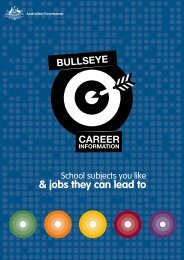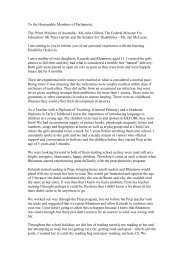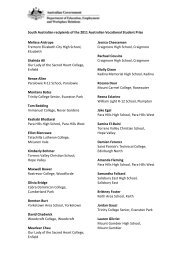Belonging, Being and Becoming - Early Years Learning Framework
Belonging, Being and Becoming - Early Years Learning Framework
Belonging, Being and Becoming - Early Years Learning Framework
Create successful ePaper yourself
Turn your PDF publications into a flip-book with our unique Google optimized e-Paper software.
LEARNING OUTCOMES<br />
OUTCOME 4: CHILDREN ARE CONFIDENT AND INVOLVED LEARNERS<br />
•<br />
•<br />
•<br />
•<br />
Children develop dispositions for learning such as curiosity, cooperation, confi dence, creativity,<br />
commitment, enthusiasm, persistence, imagination <strong>and</strong> refl exivity<br />
Children develop a range of skills <strong>and</strong> processes such as problem solving, enquiry, experimentation,<br />
hypothesising, researching <strong>and</strong> investigating<br />
Children transfer <strong>and</strong> adapt what they have learned from one context to another<br />
Children resource their own learning through connecting with people, place, technologies <strong>and</strong> natural<br />
<strong>and</strong> processed materials<br />
Children develop dispositions for learning such as curiosity, cooperation,<br />
confi dence, creativity, commitment, enthusiasm, persistence, imagination<br />
<strong>and</strong> refl exivity<br />
This is evident, for example,<br />
when children:<br />
• express wonder <strong>and</strong> interest in their<br />
environments<br />
• are curious <strong>and</strong> enthusiastic participants in<br />
their learning<br />
• use play to investigate, imagine <strong>and</strong> explore<br />
ideas<br />
• follow <strong>and</strong> extend their own interests with<br />
enthusiasm, energy <strong>and</strong> concentration<br />
• initiate <strong>and</strong> contribute to play experiences<br />
emerging from their own ideas<br />
• participate in a variety of rich <strong>and</strong> meaningful<br />
inquiry-based experiences<br />
• persevere <strong>and</strong> experience the satisfaction of<br />
achievement<br />
• persist even when they fi nd a task diffi cult<br />
Add your own examples from your context:<br />
34 BELONGING, BEING & BECOMING The <strong>Early</strong> <strong>Years</strong> <strong>Learning</strong> <strong>Framework</strong> for Australia<br />
Educators promote this learning,<br />
for example, when they:<br />
• recognise <strong>and</strong> value children’s involvement<br />
in learning<br />
• provide learning environments that are<br />
fl exible <strong>and</strong> open-ended<br />
• respond to children’s displays of learning<br />
dispositions by commenting on them <strong>and</strong><br />
providing encouragement <strong>and</strong> additional<br />
ideas<br />
• encourage children to engage in both<br />
individual <strong>and</strong> collaborative explorative<br />
learning processes<br />
• listen carefully to children’s ideas <strong>and</strong><br />
discuss with them how these ideas might<br />
be developed<br />
• provide opportunities for children to<br />
revisit their ideas <strong>and</strong> extend their<br />
thinking<br />
• model inquiry processes, including wonder,<br />
curiosity <strong>and</strong> imagination, try new ideas<br />
<strong>and</strong> take on challenges<br />
• refl ect with children on what <strong>and</strong> how<br />
they have learned<br />
• build on the knowledge, languages <strong>and</strong><br />
underst<strong>and</strong>ings that children bring to their<br />
early childhood setting<br />
• explore the diversity of cultures <strong>and</strong> social<br />
identities<br />
• promote in children a strong sense of<br />
who they are <strong>and</strong> their connectedness to<br />
others – a shared identity as Australians





